The success of international cooperation in Africa
The successful conclusion of the potentially dangerous situation in DR Congo has the UN Security Council and the European Union congratulating all parties involved, for creating a historic first in a new approach to crisis management, which lays the foundations for a lasting, rather than cosmetic, solution to deep-rooted problems.

2007, the year of the European Union-African Union Summit in Lisbon, kicks off with the international community congratulating itself on the outcome of the elections in DR Congo, won by Joseph Kabila in a free and fair, transparent process. UN Under-Secretary-Generals for Peacekeeping Operations, and Political Affairs, respectively Jean-Marie Guéhenno and Ibrahim Gambari, stated in declarations to the UNSC in mid-January that international involvement on a continued basis is fundamental to guaranteeing stability not only in single countries, but in whole regions, as in the case in Central Africa.
For Jean-Marie Guéhenno, “The resolution of the crisis in the DR Congo will benefit Africa more than solving any other of the continent’s current conflicts”. The secret for success this time was the fact that the international community did not pull out too early, which on previous occasions saw new conflicts flaring up and extra costly missions being sent as a consequence.
His main praise was for the Congolese people and their immense courage in securing their first free democratic election in 40 years and in choosing their Government, which will continue to enjoy the close support of the UN Mission in DR Congo, MONUC. This “continued engagement of the international community is also required to help the DR Congo complete a comprehensive electoral process, with local elections due in the second part of this year,” stated the Head of Peacekeeping Operations.
For Ibrahim Gambari, the success of the operation in DR Congo with the support of MONUC, the African Union, South Africa, Turkey and the European Union, provides a solid basis for other similar operations in other parts of Africa later this year.
The role of the European Union Force (EUFOR RD CONGO) was highlighted at the beginning of the year in which close ties are expected to be developed at the EU- African Union Summit in Lisbon towards the end of the year.
Javier Solana, the EU High Representative for Common Foreign and Security Policy and Secretary-General of the Council of the European Union, stated that the success of the EU’s mission had been its “crucial timing” which in turn “had been decisive in containing the potential spread of violence at a particularly sensitive moment in the election process”.
For Javier Solana, “ Key elements of the mission’s success could already be identified, including the definition of a clear mandate, both in scope and time frame, highly professional troops and an active communication policy, towards both the Congolese population and key actors in the electoral process”.
In the discussion at the UNSC, the speakers agreed that the international community needs to build on and maintain support for the authorities in RD Congo. The Security Council President for January, Vitaly Churkin (Russian Federation), stated that “a new page has been turned in the DR Congo. All of the changes had been made possible thanks to the international community, the European Union and various regional organizations”.
The year of the forthcoming EU-African Union Summit in Lisbon could not have got off to a more positive start.
Timothy BANCROFT-HINCHEY
PRAVDA.Ru
Subscribe to Pravda.Ru Telegram channel, Facebook, RSS!




